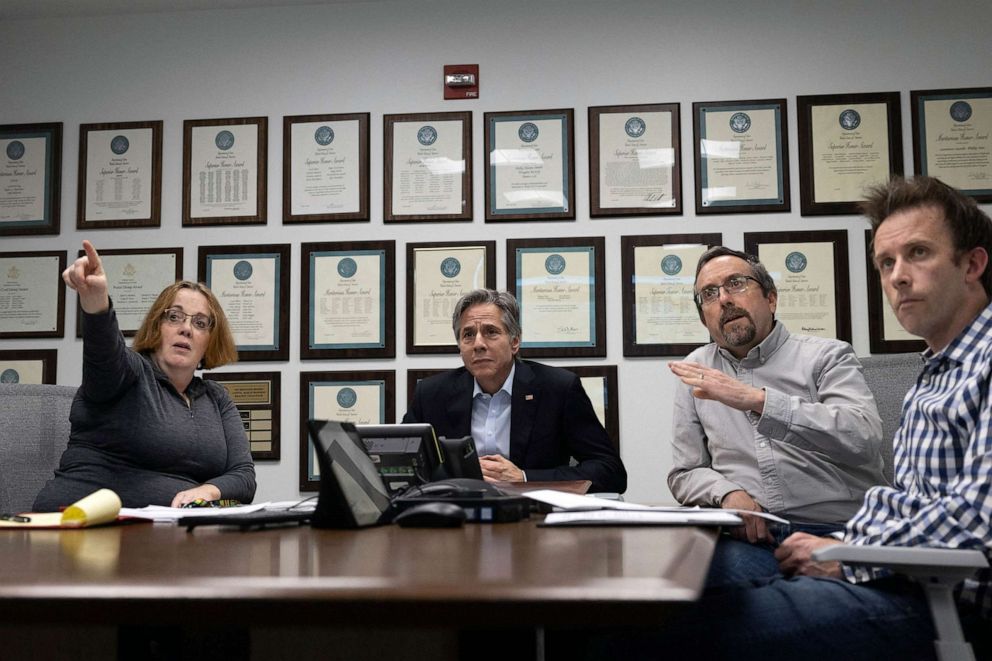经过紧张的谈判,苏丹武装部队&美国国务卿安东尼·布林肯周一下午在一份声明中表示,快速支援部队已同意从周一午夜开始在全国范围内实施72小时停火。
布林肯补充说,美国将“与地区和国际伙伴以及苏丹民间利益相关者协调,协助建立一个委员会,监督苏丹永久停止敌对行动和人道主义安排的谈判、达成和实施。”
该语句位于周末的成功行动解救了数十名美国大使馆人员华盛顿高级官员周一表示,他们不会忘记据信仍留在该国的数千名美国公民。
“在大使馆撤离行动完成后的最后36个小时里,我们继续与美国公民和与美国政府有联系的个人保持密切沟通,为那些寻求通过陆地、空中和海上转移到安全地带的人提供援助和便利的离境路线,”布林肯几小时前对记者说。
虽然还不清楚到底有多少美国人留在苏丹,但布林肯说,官员们已经与“数十人”接触,他们“表示有兴趣离开”
布林肯还说,国务院正在探索在苏丹重建外交足迹的方法,可能是在苏丹港。苏丹港是一个位于红海的城市,也是许多逃离苏丹首都喀土穆激烈暴力的人的目的地。但布林肯警告说,这将取决于该国的条件,他形容为“非常,非常具有挑战性。”
国务卿还说,国防部官员正在密切监视运送一些美国人和其他外国公民离开喀土穆的车队。
“他们中的一些人遇到了问题,包括抢劫、劫掠之类的事情,”他说。
虽然拜登政府坚持警告说,在苏丹的美国人不应该期待大规模撤离,但在周一的白宫简报会上,国家安全顾问杰克·沙利文表示,这并没有完全取消。
他说:“当然有采取措施帮助美国人离开这个国家的意愿。”。"总统要求采取一切可能的措施来帮助美国人。"
沙利文指出,该国的条件必须被认为足够安全,才能开展更大规模的行动。
他说:“现在,我们认为,我们帮助人们撤离的最佳方式实际上是支持这条陆地疏散路线,以及与正在制定自己的疏散计划的盟友和伙伴合作。”
周一早些时候,国家安全委员会发言人约翰·柯比(John Kirby)表示,美国无人机正在监视由几十名美国人组成的联合国领导的车队,确保其在驶往苏丹港时的安全。
Volker Perthes,联合国驻苏丹的安全事务特别代表,说这次旅行花了35个小时才完成。
“我们在路上遇到了一些挑战。这不是一等空运,但我认为我们一起搬出去是件好事,”佩思说。“在不太舒适的护航中呆上35个小时,肯定比在炮弹下呆上3个小时要好。”
虽然白宫继续建议仍被困在苏丹的美国公民就地避难,称为大规模撤离提供便利是不安全的,但布林肯表示,美国官员已经能够“帮助美国人融入”一些车队。
美国国务院也在通过一份危机接收表格从在苏丹的美国人那里收集信息,该表格允许公民表明他们想要离开这个国家并需要援助。
布林肯说,因为大多数美国人仍然有双重国籍,国务院预计许多人不会想离开。

2023年4月22日,美国国务卿安东尼·布林肯在华盛顿国务院监督美国驻苏丹大使馆人员的撤离行动。
国务院/通过路透社
但随着战斗进入第二周,对于许多人来说,留在活跃的战区变得越来越难以维持,比如马萨诸塞州的教师Trillian Clifford和她18个月大的女儿Alma。
“想到他们两个处于如此危险的境地,真是令人恐怖。她告诉我们关于她公寓一公里内的空袭的故事,”丽贝卡·温特,Clifford的嫂子在接受ABC新闻采访时说。"她的情况一天比一天糟糕。"
在冲突过程中,已有420多人丧生,数千人受伤。
爆炸对苏丹的基础设施造成了严重破坏,使平民逃离家园的努力变得更加困难。全国各地的电话和互联网也普遍中断,影响了被困人员与大使馆官员或国外可以提供指导的朋友和家人沟通的能力。
As Sudan cease-fire announced, some Americans still struggling to escape
After intense negotiations, the Sudanese Armed Forces& Rapid Support Forces had agreed to implement a 72-hour cease-fire across the country beginning at midnight Monday, Secretary of State Antony Blinken said in a statement Monday afternoon in Washington.
Blinken added that the U.S. would "coordinate with regional and international partners, and Sudanese civilian stakeholders, to assist in the creation of a committee to oversee the negotiation, conclusion, and implementation of a permanent cessation of hostilities and humanitarian arrangements in Sudan."
The statement comes after asuccessful operation over the weekend rescued dozens of U.S. embassy personneland their families from war-torn Sudan, and top officials in Washington saying Monday they aren't losing sight of the thousands of American citizens still believed to be in the country.
"In just the last 36 hours since the embassy evacuation operation was completed, we continue to be in close communication with U.S. citizens and individuals affiliated with the U.S. government to provide assistance and facilitate available departure routes for those seeking to move to safety via land, air and sea," Blinken told reporters hours earlier.
While it's unclear exactly how many Americans remain in Sudan, Blinken said officials had been in contact with "some dozens" who "expressed an interest in leaving."
Blinken also said that the State Department was exploring ways to reestablish a diplomatic footprint in Sudan, possibly in Port Sudan -- a city on the Red Sea and a destination for many fleeing intense violence in the capital, Khartoum. But Blinken cautioned it would depend on the conditions in the country, which he described as "very, very challenging."
The secretary also said officials within the department were closely monitoring convoys transporting some Americans as well as other foreign nationals away from Khartoum.
"Some of them have encountered problems including, robbery, looting, that kind of thing," he said.
While the Biden administration is standing by its warning that Americans in Sudan should not expect a mass evacuation, during a White House briefing on Monday national security adviser Jake Sullivan said it wasn't completely off the table.
"There's certainly a willingness to take steps to help Americans be able to get out of the country," he said. "The president has asked for every conceivable option to be able to help Americans."
Sullivan noted that conditions in the country would have to be deemed secure enough to carry out a larger operation before one could take place.
"Right now, we believe that the best way for us to help facilitate people's departure is in fact to support this land evacuation route, as well as work with allies and partners who are working on their own evacuation plans as well," he said.
Earlier on Monday, National Security Council spokesperson John Kirby said U.S. drones were watching over a United Nations-led convoy that consisted of dozens of Americans, ensuring its safety as it navigated to Port Sudan.
Volker Perthes, the U.N.'s special representative of the body's security-general to Sudan, said the journey took 35 hours to complete.
"We had some challenges on the road. It wasn't first class airlift, but I think it was good that we all together moved out," Perthes said. "35 hours in a not-so-comfortable convoy is certainly better than three hours bombing and sitting under the shells."
While the White House is continuing to advise U.S. citizens still trapped in Sudan to shelter in place, saying it's not safe to facilitate a mass evacuation, Blinken said American officials have been able to "facilitate Americans being folded into" some convoys.
The State Department is also collecting information from Americans in Sudan through a crisis-intake form that allows citizens to indicate they want to leave the country and need assistance.
Blinken said because the majority of Americans still there are dual citizens, the State Department anticipates many won't want to leave.
But as the fighting enters its second week, remaining in an active warzone is becoming increasing untenable for many, like a Massachusetts teacher Trillian Clifford and her 18-month-old daughter Alma.
"To think that the two of them are in this much danger is horrific. She's telling us stories about airstrikes within a kilometer of her apartment," Rebecca Winter, Clifford's sister-in-law said in an interview to ABC News. "Her situation is becoming more dire every day."
Over 420 people have already been killed during the course of the conflict, and thousands more have been injured.
Explosions have inflicted heavy damages on Sudan's infrastructure, complicating civilians' efforts to flee. Widespread phone and internet outages have also been reporter across the country, impacting stranded individuals' ability to communicate with embassy officials or friends and family outside of the country who can provide guidance.






